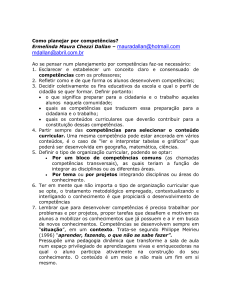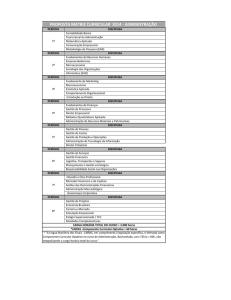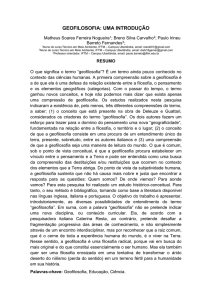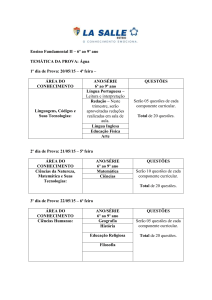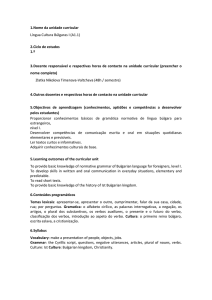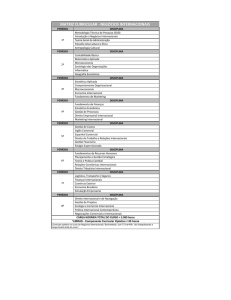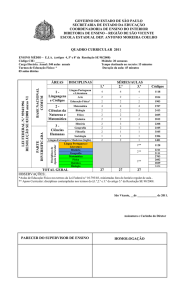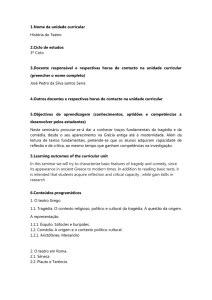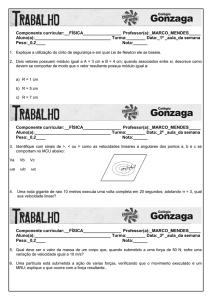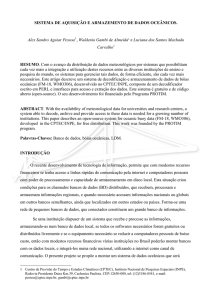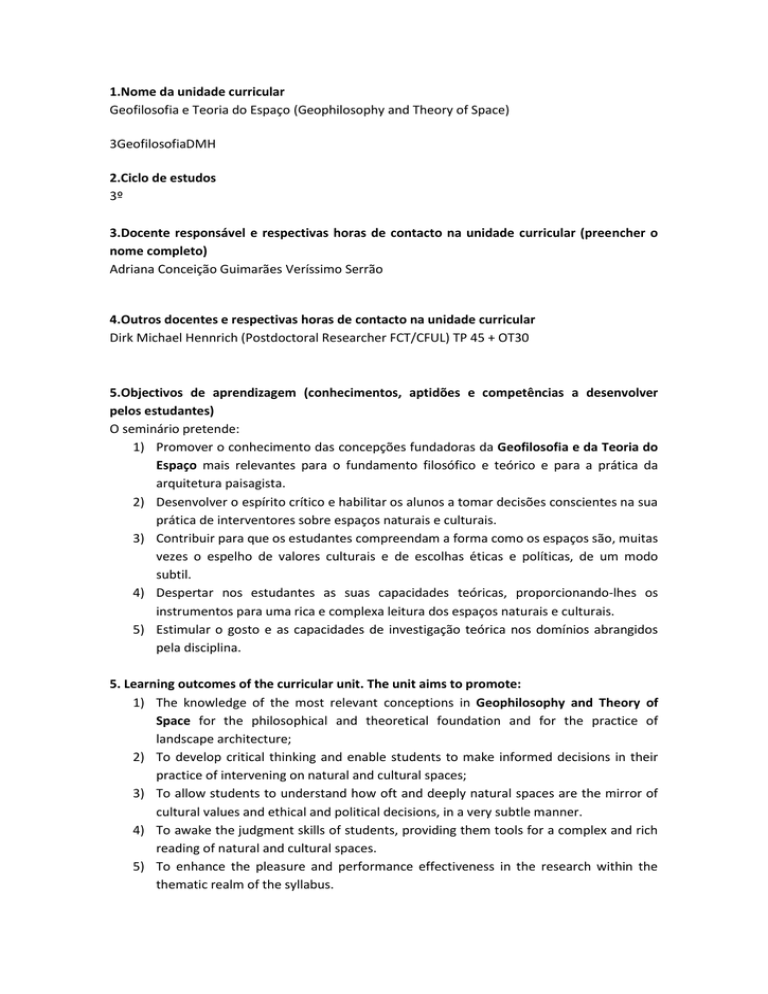
1.Nome da unidade curricular
Geofilosofia e Teoria do Espaço (Geophilosophy and Theory of Space)
3GeofilosofiaDMH
2.Ciclo de estudos
3º
3.Docente responsável e respectivas horas de contacto na unidade curricular (preencher o
nome completo)
Adriana Conceição Guimarães Veríssimo Serrão
4.Outros docentes e respectivas horas de contacto na unidade curricular
Dirk Michael Hennrich (Postdoctoral Researcher FCT/CFUL) TP 45 + OT30
5.Objectivos de aprendizagem (conhecimentos, aptidões e competências a desenvolver
pelos estudantes)
O seminário pretende:
1) Promover o conhecimento das concepções fundadoras da Geofilosofia e da Teoria do
Espaço mais relevantes para o fundamento filosófico e teórico e para a prática da
arquitetura paisagista.
2) Desenvolver o espírito crítico e habilitar os alunos a tomar decisões conscientes na sua
prática de interventores sobre espaços naturais e culturais.
3) Contribuir para que os estudantes compreendam a forma como os espaços são, muitas
vezes o espelho de valores culturais e de escolhas éticas e políticas, de um modo
subtil.
4) Despertar nos estudantes as suas capacidades teóricas, proporcionando-lhes os
instrumentos para uma rica e complexa leitura dos espaços naturais e culturais.
5) Estimular o gosto e as capacidades de investigação teórica nos domínios abrangidos
pela disciplina.
5. Learning outcomes of the curricular unit. The unit aims to promote:
1) The knowledge of the most relevant conceptions in Geophilosophy and Theory of
Space for the philosophical and theoretical foundation and for the practice of
landscape architecture;
2) To develop critical thinking and enable students to make informed decisions in their
practice of intervening on natural and cultural spaces;
3) To allow students to understand how oft and deeply natural spaces are the mirror of
cultural values and ethical and political decisions, in a very subtle manner.
4) To awake the judgment skills of students, providing them tools for a complex and rich
reading of natural and cultural spaces.
5) To enhance the pleasure and performance effectiveness in the research within the
thematic realm of the syllabus.
6.Conteúdos programáticos
O seminário funcionará através do regime de módulos, de acordo com o elenco abaixo
indicado:
1. Viragens culturais no século 20.
2. Introdução à ‘Teoria do Espaço’.
3. Introdução à ‘Geofilosofia’.
4. Filosofia da Paisagem e Arquitectura Paisagista.
5. ‘Filosofia do Corpo Vivo’.
6. Aspectos éticos da experiencia física do espaço.
7. A ‘viragem espacial’ e a ‘crise ambiental’: Perspectivas.
6.Syllabus
The seminar will work according to a modular system, which is described below: ~
1. ‘Cultural turns’ in the 20th Century.
2. Introduction to the ‘Theory of space’.
3. Introduction to ‘Geophilosophy’.
4. ‘Philosophy of Landscape’ and ‘Landscape Architecture’.
5. ‘Philosophy of the Body’.
6. Ethical aspects of the physical experience of space.
7. The ‘spatial turn’ and the ‘ambiental crisis’: Perspectives.
7.Demonstração da coerência dos conteúdos programáticos com os objectivos de
aprendizagem da unidade curricular
Existe uma adequada e coerente relação entre os conteúdos programáticos e os objectivos da
aprendizagem da unidade curricular. Tanto as questões centrais do curso como os materiais
bibliográficos que as suportam permitem ao estudante desenvolver as suas capacidades de
compreensão e de investigação em torno dos seguintes temas e categorias centrais:
1. O ‘spatial turn’ e as novas orientações nos estudos culturais.
2. Textos fundamentais da ‘Teoria do Espaço’ e da ‘Geofilosofia’.
3. A emancipação crescente do ‘espaço’ no século 20.
4. As relações entre ‘Teoria do Espaço’, ‘Geofilosofia’ e ‘Filosofia da Paisagem’.
5. Corpo, Espaço e Paisagem: Elementos para um renovado ‘Ethos da Terra’.
7.Demonstration of the syllabus coherence with the curricular unit's objectives
There is a fine and consistent relationship between the Syllabus and the curricular learning
objectives. Both the core issues of the course as the bibliographic materials that support them,
allow students to develop their understanding and research skills of the following core subjects
and categories:
1.
2.
3.
4.
The ‘spatial turn’ and the new orientations in cultural studies.
Fundamental texts of ‘Theory of Space’ and ‘Geophilosophy’.
The increasing emancipation of space in the 20th Century.
The relation between the ‘Theory of Space’, ‘Geophilosophy’ and ‘Philosophy of
Landscape.
5. Body, Space and Landscape: Elements for a renewed ‘Ethos of the Earth’.
8.Metodologias de ensino (avaliação incluída)
A unidade curricular funciona em regime de seminário presencial. A capacidade de apresentar
e defender um ponto de vista, o uso da argumentação e o exercício do pensamento crítico são
competências que apenas podem ser desenvolvidas num espaço colectivo. Cada sessão do
seminário constará de diversos momentos: a) de uma exposição por parte do docente; b) da
leitura e interpretação dos textos seleccionados; c) da apresentação e discussão de leituras.
Os alunos poderão escolher entre dois modelos de avaliação:
a). Apresentação de textos teóricos na aula: (40%), prova escrita (50%), assiduidade (10 %).
b.) Apresentação de textos teóricos na aula: (40%), Ensaio (entre 6-10 páginas) (50 %),
assiduidade (10 %).
O processo de avaliação será contínuo. Todos os trabalhos e etapas de avaliação serão
preparados num estreito contacto entre docentes e discentes
8.Teaching methodologies (including evaluation)
The unit works in seminar attendance system. The ability to present and defend a point of
view, the use of arguments and the exercise of critical thinking are skills that can only be
developed in a collective sphere. Each seminar session will consist of several stages: a) an
exposition by the teacher; b) commentary and interpretation of selected texts; c) presentation
and discussion of individual reports. Students may choose between one of the two following
evaluation formats:
a) Presentation of theoretical texts in the lesson (40%); written examination on the
classroom about the general topics of the syllabus (50%); Assiduity (10%).
b) b.) Presentation of theoretical texts in the lesson (40%); Short Essay (6-10 pages) (50
%): Assiduity (10 %)
The evaluation will be continuous and cumulative, depending on the classification of the
level of maturity attained. All papers will be subject to preparation and discussion with the
teacher, in the space of the seminar and tutorial sessions.
9.Demonstração da coerência das metodologias de ensino com os objectivos de
aprendizagem da unidade curricular
A frequência desta disciplina permitir aos alunos: a) a aquisição de competência no uso dos
conceitos como Geofilosofia, Espaço, Paisagem, Ambiente, Natureza, Cultura; b) o
conhecimento das teorias clássicas e contemporâneas mais relevantes da Geofilosofia e a da
Teoria do Espaço, na base da leitura e interpretação de textos selecionados; c) o exercício do
pensar crítico e a tomada de consciência em situações concretas partindo da análise de casos
de estudo. Os alunos deverão: 1. Conhecer os conteúdos do programa apresentado, bem
como a bibliografia essencial e o estado da questão. 2. Ler e compreender textos
fundamentais sobre a temática da Geofilosofia e da Teoria do Espaço. 3. Analisar e interpretar
correctamente as teorias propostas, sabendo dilucidar as diferentes concepções em causa e os
problemas por elas levantados. 4. Argumentar criticamente e intervir na discussão. 5. Elaborar,
com autonomia, ensaios críticos.
9.Demonstration of the coherence between the teaching methodologies and the learning
outcomes
The attendance of this seminar allow students to: a) the development of skills in the use of
concepts such as Geophilosophy, Space, Landscape, Environment, Nature, Culture; b) the
knowledge of the most relevant classical and contemporary theories in Geophilosophy and
Theory of Space, on the basis of reading and interpretation of selected texts; c) the exercise of
critical thinking and awareness in concrete situations based on the analysis of case studies.
Students will: 1. Know the contents of the program presented, and the essential bibliography
and the state of art. 2. Read and understand basic texts on the subject of Geophilosophy and
Theory of Space. 3. Analyze and correctly interpret the theories proposed, knowing elucidate
the different concepts involved and the problems they raised. 4. To argue critically and
intervene in the discussion. 5. Develop, with autonomy, critical essays.
10.Bibliografia
Gaston Bachelard, A Poetica do Espaço, tradução António de Pádua Danesi. (2ª ed). - São
Paulo: Martins Fontes, 2008
Doris Bachmann-Medick, Cultural Turns, Neuorientierungen in den Kulturwissenschaften, 5ª
ed., Reinbeck bei Hamburg: Rowohlt Taschenbuch Verlag, 2014.
Luisa Bonesio, Geofilosofia del peasaggio, Milano: Mimesis, 1997.
Mike Crang/Nigel Thrift (ed.), Thinking space, London: Routledge, 2000.
Gilles Deleuze e Felix Guattari, ‘Geofilosofia’, in: O que é a Filosofia?, tradução de Margarida
Barahona, António Guerreiro, Lisboa: Presença, 1992.
Jörg Dünne/Stephan Günzel (ed.), Raumtheorie, Grundlagentexte aus Philosophie und
Kulturwissenschaften, Frankfurt a. M.: Surhkamp, 2006.
Dirk Michael Hennrich, “Paisagem e Identidade Europeia”, Filosofia e Arquitectura da
Paisagem. Um Manual, Adriana Veríssimo Serrão (coord.), Centro de Filosofia da
Universidade de Lisboa, 2012, pp.131-139.
Filosofia da Paisagem. Uma Antologia, Adriana Veríssimo Serrão (coord.), Lisboa, Centro de
Filosofia da Universidade de Lisboa, 2011.

![Seminário [História Antiga]](http://s1.studylibpt.com/store/data/001254899_1-5f51363e7ff1a9132562b4d14bd1112c-300x300.png)
